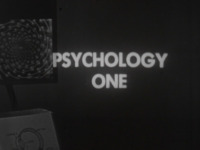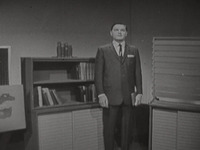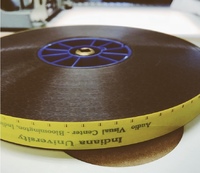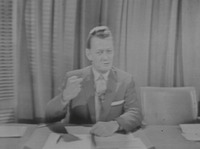Browse Exhibits (4 total)
Psychology One

37 episodes, 1957, WGBH (Boston)
From WNET:
"The purpose of “Psychology One” is to show anyone who is interested how man – any human being – works. The course, an adaptation of the course Professor Edwin J. Boring has given at Harvard for thirty-two years, will discuss human thought and conduct as a function of their causes: the scientific and biological view of man as a part of the nature world – why he is the way he is. So Professor Boring starts out with a discussion of the nervous system and of reaction to stimulation. When he shoots off his revolver even the TV audience is going to jump because that reaction is already built into their nervous systems. He will talk about instinctive reaction, about motivated reaction, then about how people learn new reactions and how they change the old ones, and then about they perceive the outside world by use of the five senses, and finally about their abilities and personalities – how people differ from one another, how they grow up, how they adjust to one another and to the difficulties of living. Whenever possible, the TV audience will become the subjects in Professor Boring’s demonstrations. On the TV screen they can see many of the perceptual phenomena that he talks about – illusions, after-images, the way the size of objects seem to vary with their distance. In one sense, man is seen as a complex machine – in another sense, he is free to choose what he will do. But the main thing is to find out how a human being works, and why. Produced by WGBH-TV, Boston, “Psychology One” was produced and directed by Thomas K. Sissow."
Escape from the cage

11 programs, 1960, WCET (Cincinnati)
From WNET:
"Escape from the Cage is a series designed to present some basic information on the subject of mental health and illness. Starting from the premise that there is a great need for correct information about this problem, the series of eleven programs presents the history of the treatment of mental illness from earliest times to today, and the techniques currently in use as well as the theories which guide research in the field. Psychosurgery, drug therapy, the open hospital, child psychology and psychotherapy, organic and psychodynamic research, are defined and described in film clips of hospitals and research centers, and by doctors and psychiatrists currently working in different areas of the field."
Focus on behavior

10 episodes, 1963, Mayer-Skylar Productions
Frm WNET:
"This series presents current research in experimental psychology which reveals significant concepts, methods and new advances in the scientific study of behavior. Each program is a filmed visit to the laboratories of distinguished men and women, experimental psychologists involved in this study. These films provide the viewer with a deeper understanding of the nature of basic research. They were designed to develop public appreciation of psychology as the scientific study of behavior, to stimulate interest among high-school students who might wish to pursue the study of psychology on a college level, to create an instructional resource that will contribute to the improved teaching of psychology in college, and to stimulate interest among students in psychology as a career.
Focus on Behavior affords audiences an opportunity to look over the shoulder of the scientists at work. Produced under the auspices of the American Psychological Association, the series was made possible by a grant from the National Science Foundation. While the series as a whole presents a broad view of the role of experimental psychology, each program is compete in itself. The series was filmed on location at leading U.S. universities, two hospitals, and an Air Force Base. The actors were the psychologists and other actual participants in the experiments. The “sets” were the actual laboratories or other places where the experiments were in progress."
Not in our stars

13 episodes, 1956, KOMU (Columbia, Missouri)
From WNET:
"Theme of the thirteen kinescoped television programs in this series is summed up in the quote from Shakespeare, “The fault, dear Brutus, is not in our stars, but in ourselves, that we are underlings.” A psychology series, the program feature Dr. Fred McKinney, for many years chairman of the department of psychology at the University of Missouri. The series is designed to show how the usually abstract material in psychology applies in the life of every person. Dr. McKinney’s presentation is simple, warn and planned to catch and hold the attention of the average viewer. The lectures are supplemented by skits mirroring real life and each point is clarified by visually striking demonstrations, interviews and chalk talks. Subjects range from “Our Differences from Others” to “Maturity” and to “Mistakes.” The series should be interesting, informative and even entertaining for most viewers – but some points are handled rather superficially. Dr. McKinney and his easy-going performance are the best assets of “Not in Our Stars.”"

